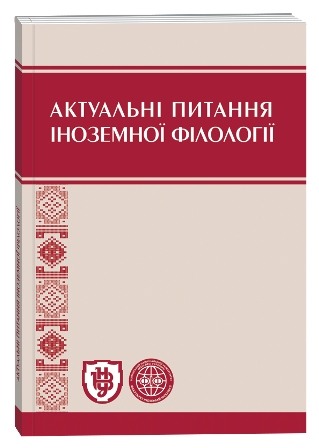THE MODALITY OF AFFIRMATION AND NEGATION IN ENGLISH AND UKRAINIAN: LINGUOPRAGMATIC APPROACH
DOI:
https://doi.org/10.32782/2410-0927-2021-15-16Keywords:
illocution, negation, affirmation, anthropocentric approach, modal categoryAbstract
Comparative study of the modal category of affirmation-negation in terms of its pragmatic characteristics on the basis of English and Ukrainian languages is appropriate and timely both in the field of linguistic theory and to solve a number of applied problems. The purpose of the study is due to the transition to anthropological linguistics (pragmatics), changing the object of study – speech activity of people, that part of it which relates directly to acts of verbalization of thought and realization of intentions of the speaker, search for pragmatic universals and national-cultural specifics between English and Ukrainian, on the one hand and the growing need for the development of such branches of applied linguistics as translation theory, methods of teaching English and Ukrainian as foreign languages – on the other. The reliability and validity of the results obtained is ensured by the methodological basis of the study. The theoretical basis of the work are linguistic and philosophical concepts relating to the general, essential characteristics of language – language as a means of communication, the active nature of language, the duality of the language sign, the relationship of language and thinking; main theses of SAT (Speech Acts Theory), general theory of translation; intentional theory by O. G. Pocheptsov, the concept of metalanguage of science by N. B. Gvishiani, metalanguage approach to modeling linguistic realities by G. P. Nimets, semantic-semiotic model of translation by A. D. Schweizer. Research methods are determined by the specifics of the subject of research and the goals and objectives. The main research methods are inductive-deductive method, modeling, methods of comparative, contextual and transformational analysis. The scientific novelty of the work is that for the first time a comprehensive analysis of a single modal category of affirmation-negation, the constituents of which – affirmation and negation – are considered as equal objects of scientific knowledge; a pragmatic typology of utterances is proposed, universal for the English and Ukrainian languages; the illocutionary nature of affirmative and negative modalities in some pragmatic types of statements is investigated and proved; the metalanguages of the illocutionary level of communication – the ultimate linguistic intentions in which the statement and / or negation is manifested illocutionary are described; the comparative characteristic of final language intentions of the English and Ukrainian languages in the aspect of universal and ethnospecific orientation is given; the translation of the final linguistic intentions, which include affirmation and negation, is studied, and its regularities are established. In conclusion, it should be noted that the translation of the modality of affirmation and negation in those pragmatic types of expression, where they are illocutionary, depends on the type of ultimate intention of the language of translation.
References
Почепцов Г. Г. Теория коммуникации. М. : «Рефл-бук». К. : «Ваклер». 2001. 656 с.
Почепцов О. Г. Основы прагматического описания предложения. Киев, 1986. 115 с.
Bach K., Harnish R. M. Linguistic communication and speech acts. Kent Bach. Cambridge : M. I.T. Press. 1979. 327 p.
Leech G. Principles of Pragmatics. London, New York : Longman, 1983. 257 p.







